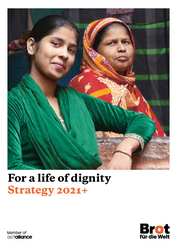Fair Digitalisation for Everyone around the World
... more


Only a small number of people in the Global South have been able to benefit from the digital transformation so far, due to lack of literacy, inadequate technical skills or lack of online access. At the same time, many services in areas such as healthcare and education are only available digitally. The same is true of access to many markets. The necessary infrastructure and skills in dealing with digital media are therefore essential prerequisites for a self-determined life – as well as for political involvement. Global movements have begun in the digital space – such as those for climate protection and for women's rights. Today, sustainable development and an active global civil society are barely conceivable without digitalisation.
At the same time, we must also be vigilant when it comes to the downside of digitalisation. Left unchecked, the digital transformation will further accelerate the consumption of resources and energy and thus the damage to the environment and climate. In addition, digital technologies increasingly allow authoritarian governments to monitor and repress their citizens. We are already seeing civil society’s freedom of action being further constrained in many countries through surveillance and through severe restriction of digital rights. Independent media are also coming under pressure, and targeted disinformation is eroding trust.
Digitalisation can also have negative effects on the labour markets in developing and emerging countries. Studies predict that digitally driven automation could destroy up to two thirds of all current jobs. Without state intervention, the number of precarious jobs on the informal labour markets is likely to rise further. As a result, existing inequalities within countries and between industrial and developing nations will continue to increase.
Everyone should be able to make full use of the opportunities of digitalisation to participate in society and in politics. This requires a functioning infrastructure and acquisition of the necessary skills. Digitalisation must be fair, sustainable and climate-neutral and must respect human rights. Digitalisation offers opportunities for realising the 2020 sustainable development agenda and a globally connected civil society. These opportunities must be seized.
We also have to counter the negative side effects of digitalisation. Wherever rights to freedom, digital rights and participation are at risk, we raise our voice and thus help to mitigate the growing social and economic inequality.
At international level, the acceleration of digitalisation must be accompanied by government regulatory frameworks, including in the labour market. We are pushing for internationally binding regulations to ensure that everyone has control over their own data. Regarding these data, there must not be an excessive concentration of power in the hands of few players.

“
„I meet other farmers from the village at the rice and chilli-growing workshops. We do agricultural experiments together. For example, we are finding out what type of fertiliser produces the highest yields. I especially like the fact that the project has scientific backing. We can use our smartphones to send our questions to the people from the university at any time and share information with them.
“
Dewi (35)
farmer from Buntu Datu/Indonesia
We develop with our partner organisations project approaches for development cooperation and for the role of civil society in the digitalised world. These should provide ethical guidance and promote digital participation.
We push increasingly for local digital solutions. At the same time, we support digital networking at international level as well as the sharing of knowledge or successful projects between partners.
We facilitate – together with our partners – fair digital participation that ensures the protection of digital rights and human rights in the digital space, so that vibrant civil societies can develop freely and safely.
We specifically foster the development of digital skills and digital leadership in civil society. We provide competent, long-term and reliable support for people to become actively involved in society and politics in the digital space.
We also strengthen our own internal digital know-how.
